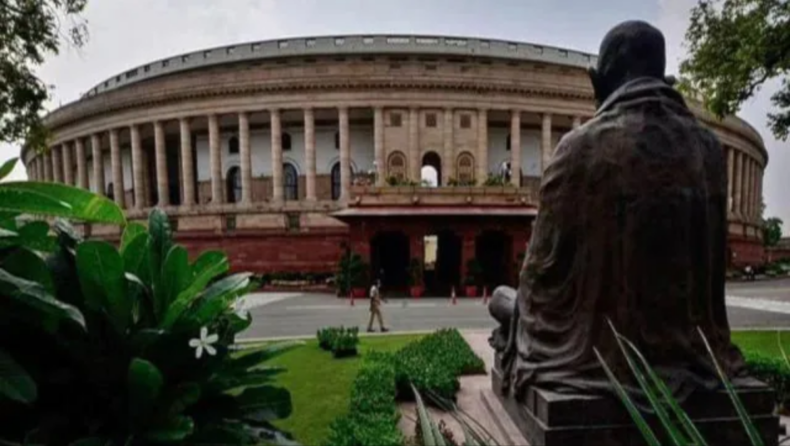A list of phrases declared unparliamentary by the Chair has been made public by the Lok Sabha Secretariat. Included are adjectives such as “anarchist,” “dictatorial,” “taanashah,” “Jaichand,” “vinash purush,” “Khalistani,” and “khoon se kheti.” Certain English terminologies have been flagged by the Secretariat as being inappropriate for use in legislative proceedings. Any insults aimed against the chair in either English or Hindi are included in the list of forbidden words.
According to a new booklet from the Lok Sabha Secretariat, use of terms like “jumlajeevi,” “baal buddhi,” “Covid spreader,” and “Snoopgate” as well as commonly used words like “ashamed,” “abused,” “betrayed,” “corrupt,” “drama,” “hypocrisy,” and “incompetent” will now be regarded as unparliamentary in both the Lok Sabha and Rajya Sabha.
During the monsoon session, which starts on July 18, terms like “anarchist,” “Shakuni,” “dictatorial,” “taanashah,” “taanashahi,” “Jaichand,” “vinash purush,” “Khalistani,” and “khoon se kheti” would also be banned from usage if they are used in both houses during debates or in other contexts.
The brochure also includes a list of other terms that the Lok Sabha secretariat considers to be unparliamentary phrases, including “dohra charitra,” “nikamma,” “nautanki,” “dhindora peetna,” and “behri sarkar.”

The Lok Sabha Secretariat has created a list of phrases and expressions that are occasionally deemed unparliamentary by the Chair in various legislative bodies across the nation and in Commonwealth Parliaments for easy access in the future.
But when it comes to removing phrases and terms, the Speaker of the Lok Sabha and the Chairman of the Rajya Sabha will have the last say.
The compilation includes references to phrases that, in addition to those forbidden in several Commonwealth Parliaments in 2020, were deemed unparliamentary in the Lok Sabha, Rajya Sabha, and state legislatures of India in 2021.
According to the list, some of the keywords might not seem improper if they are read alongside other terms used during legislative sessions.
The list of prohibited languages also includes any disparaging remarks directed towards the Chair in either English or Hindi, which will be deemed unparliamentary and struck from the Parliament’s records.
The Rajya Sabha Chairman or Lok Sabha Speaker examines the words used in the house during the session, and the Chair strikes out unparliamentary language. Such terms are not included in the Lok Sabha or Rajya Sabha records of Parliament.
The Secretariat has identified certain English terms as being improper for use in parliamentary proceedings, including “bloodshed,” “bloody,” “betrayed,” “abused,” “cheated,” “chamcha,” “chamchagiri,” “chelas,” “childishness,” “corrupt,” “coward,” “criminal,” and “crocodile tears.”
Along with the term “disgrace,” other words including “donkey,” “drama,” “eyewash,” “fudge,” “hooliganism,” “hypocrisy,” “incompetent,” “mislead,” “lie,” and “untrue” would no longer be allowed to be used in Parliament.
Anarchist, Gaddar, Girgit, Goons, Ghadiyali Ansu, Apmaan, Asatya, Ahankaar, Corrupt, Kala Din, Kala Bazaari, and Khareed Farokht are a few of the Hindi terms that are categorized as being unparliamentary.
Additionally, terms like “danga,” “dalal,” “daadagiri,” “dohra charitra,” “bechara,” “bobcut,” “lollypop,” “samvedanheen,” “foolish,” “pitthu,” “behri sarkar,” and “sexual harassment” would be seen as impermissible and excluded from the record.
Attack from the Opponent
Senior members of Parliament have questioned the purpose of such a notice, including Jairam Ramesh, Derek O’Brien, Randeep Surjewala, and Priyanka Chaturvedi.
https://twitter.com/RahulGandhi/status/1547487244063125504?s=20&t=CAeN43HGGumu4s3_s_8Qpw
https://twitter.com/MahuaMoitra/status/1547420848348311553?s=20&t=2d-LnDWyQDyQjxVnKtBBgg
He denies imposing a ban.
Om Birla, the Speaker of the Lok Sabha, stated on Thursday that no words are forbidden from usage in the House and that members are allowed to voice their opinions so long as they respect other members’ feelings.
In reference to the publication of the pamphlet gathering lists of terms and expressions deemed unparliamentary, he noted, “It has been a normal procedure to occur since 1954.” According to Birla, both opposition and ruling party members have used the terms that would be deleted.












